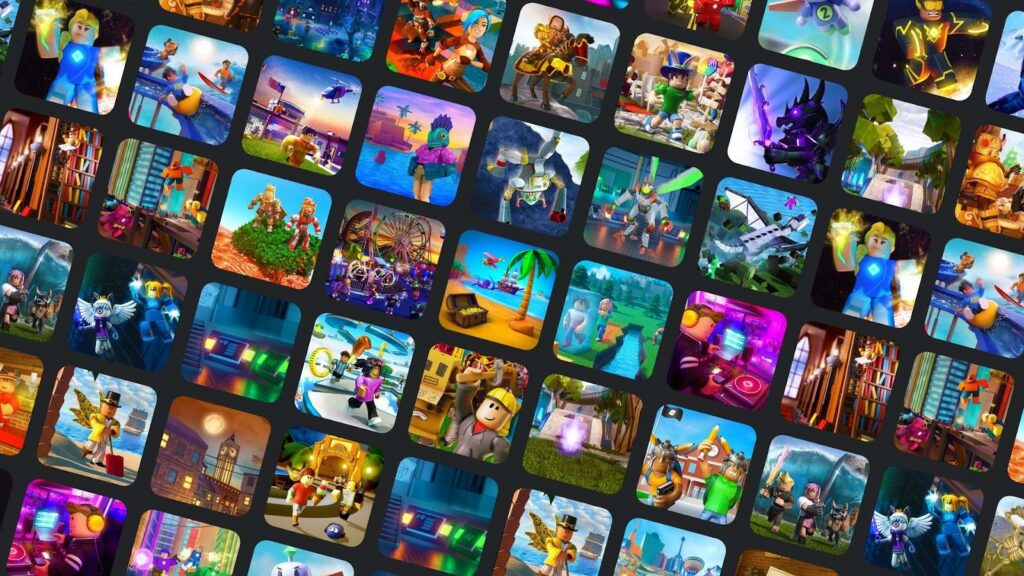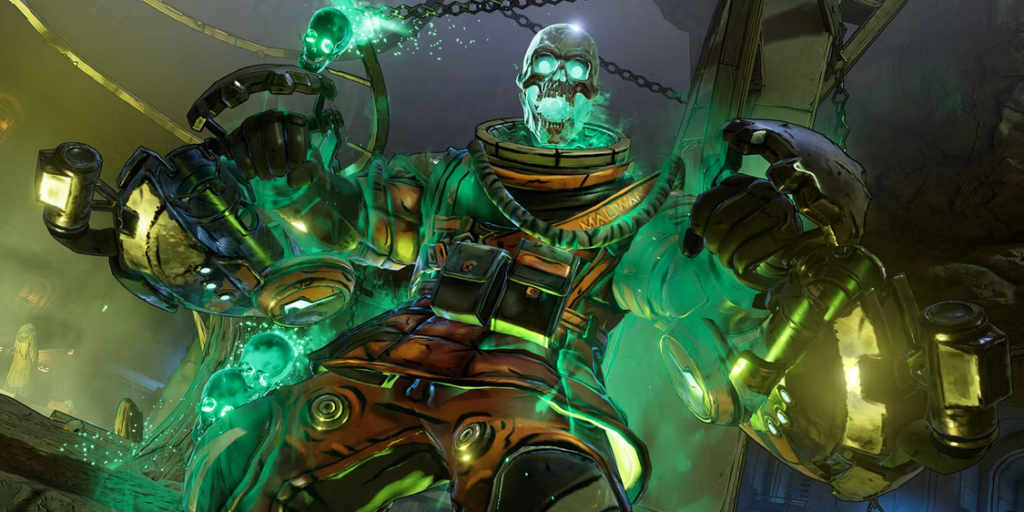
The game industry has undergone a major change in the way that content is produced and consumed in the last few years.
We have seen expansive virtual worlds, “forever” games, and user-generated content (UGC) platforms. Games like Grand Theft Auto V, Roblox, Fortnite, and others are long-lasting, broadly accessible across platforms, and contain a greater variety of experiences than their predecessors. The enormity of these games has allowed them to dominate sales and streaming charts years beyond launch.
The massive audiences flocking to these platforms are younger, more diverse, and expect more personalized experiences than ever before. Though these games command enormous user bases, players are spread over myriad smaller experiences within each game’s boundaries, jumping from one to another with ease. These experiences are also increasingly being created by fellow players rather than the platforms themselves, leading to a growing creator class of amateur developers, hobbyist tinkerers, and small server operators.
As games have grown and the experiences within them have become more personalized, game server operators have increasingly important roles in the growth and maintenance of these virtual worlds.
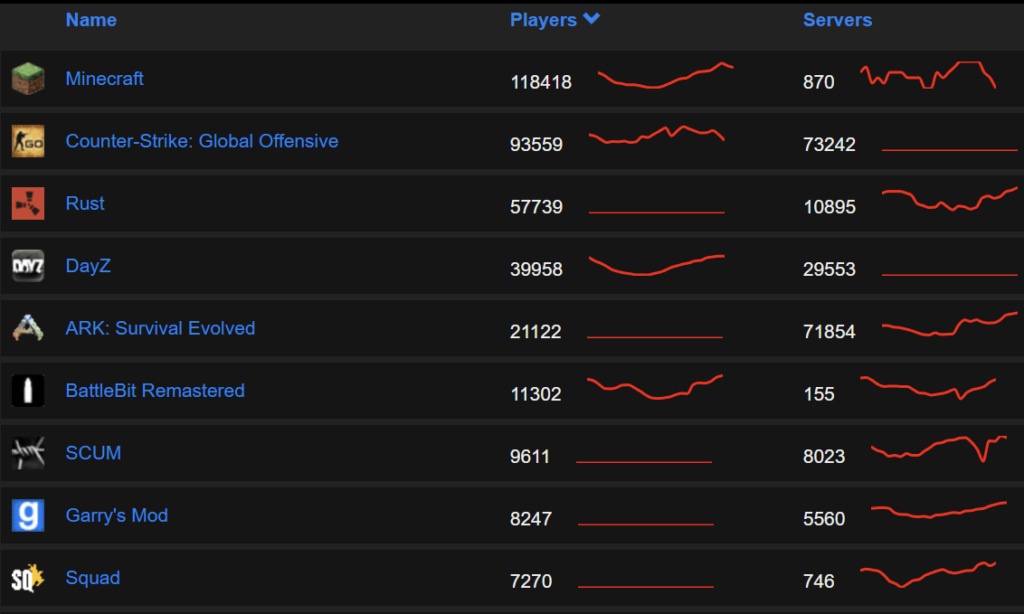
Game servers continually attract serious player engagement | Source
More bespoke experiences are being created by server operators, more companies (such as Rockstar Games) are incorporating player-operated servers into their gaming ecosystems, and more gamers are flocking to these servers.
They not only fulfill players’ needs but provide bespoke experiences that would not otherwise be available. Several have grown into businesses and cultural touchstones in their own right:
- Hypixel, a popular Minecraft server that spun out a dedicated development team to create its debut title, Hytale. Its trailer racked up more than 30m YouTube views in less than a month, and the team later got acquired by Riot Games.
- NoPixel, a Grand Theft Auto V roleplaying server that dominated the Twitch charts with its invite-only community and unique spin on the core GTA gameplay.
- DreamSMP, an invite-only Minecraft server that hosted a months-long political drama among several prominent streamers. It attracted millions of viewers on Twitch and YouTube.
In this essay, we drill into the increasing prevalence and power of these servers and their operators as new manifestations of the Creator Economy within gaming.
While one might think of streamers, influencers, esports pros, developers, and modders when we refer to content creators, there is an under-discussed community of server operators out there creating new micro-businesses that fulfill player needs and create value for the platforms they work on. We'll dive into the specifics and share where this is all going, but let's first get aligned on what server operators do and how this came to be.
What is a “Dedicated Game Server”?
A “dedicated game server” is a user-controlled instance of a game. These are typically “unofficial” in the sense that they are administered by individuals or small groups of players, rather than by the company that operates the game with its own “official” servers. In some cases, they are provided by the game platform as a service, while other games might require players to spin up their own servers and shoulder the hosting costs themselves.
Game servers (sometimes also referred to as “private servers”) historically operated outside the watchful eyes of game publishers. In the early days of MMORPGs, fans of games like Ultima Online and World of Warcraft emulated the server architecture of their favorite games to enable new experiences not available in the original game. In some cases, this also enabled game piracy, skirting around CD key requirements and centralized authentication processes. Publishers were naturally not keen to have thousands of pirated copies of their games freely available on the internet, and legal action ensued.
Over time, however, this legal gray area has changed as the industry around it has shifted. Two related trends – the growing acceptance of modding communities and the rise of UGC games and platforms – have converged to create a more permissive environment for unofficial game servers. Tools like CurseForge have emerged to make modding easier, safer, and more accessible to players and developers alike. Publishers have now witnessed multiple waves of innovation from modding communities (MOBAs, auto-battlers, battle royale games, and more), signifying the value of player-created content.
As the modding community battled with incumbent games publishers in the 2000s and 2010s, upstarts like Minecraft and later Roblox would capture a new generation of audiences with their creator-first sandbox gameplay, inspiring a host of competitors to follow suit. These two macro trends have put greater creative freedom in the hands of players and builders, necessitating the need for more robust server infrastructure, streamlined access to dedicated servers, and improved tooling for server management.
At their simplest, these game servers are private gathering places for groups of friends or like-minded users to socialize and play together. They may feature specific game modes, rulesets, or entry requirements, and sometimes, servers are targeted at specific player behaviors, such as XP farming, competitive PvP, or role playing. More advanced servers may even have bespoke game modes, gameplay features, and monetization options unavailable in the base game.
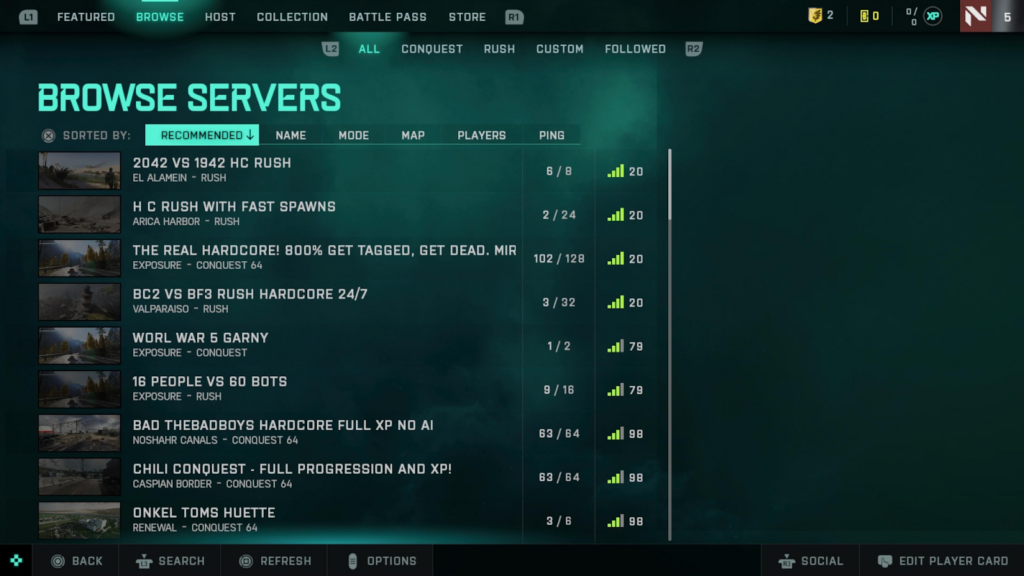
An example of servers being used in EA’s Battlefield 2042 | Source
Importantly, there is a difference between a game server and a UGC game experience created for platforms like Roblox or Fortnite. UGC game experiences offer new takes on the core features of the platform, are available for any player to join, and are typically hosted by the platform itself. Servers, on the other hand, can be open to the public or restricted to certain players only. In many cases, server operators also pay platforms to operate these separate instances. They may also utilize services like Shockbyte or Overwolf’s Tebex to handle additional tasks not covered by the platform, such as payment processing or DDoS protection.
Server operators can deliver a more niche experience for a more focused community. This narrower focus does not mean that these servers are small – as we’ll discuss later, some of these servers have grown to become quite large.
Additionally, these servers can exist in all manner of games. They are most frequently associated with MMORPGs and competitive multiplayer games such as World of Warcraft, Counter-Strike: Global Offensive, and Rust. However, servers can also be used in many other types of games, such as the physics sandbox Garry’s Mod, or many of the casual UGC experiences in Roblox (below)
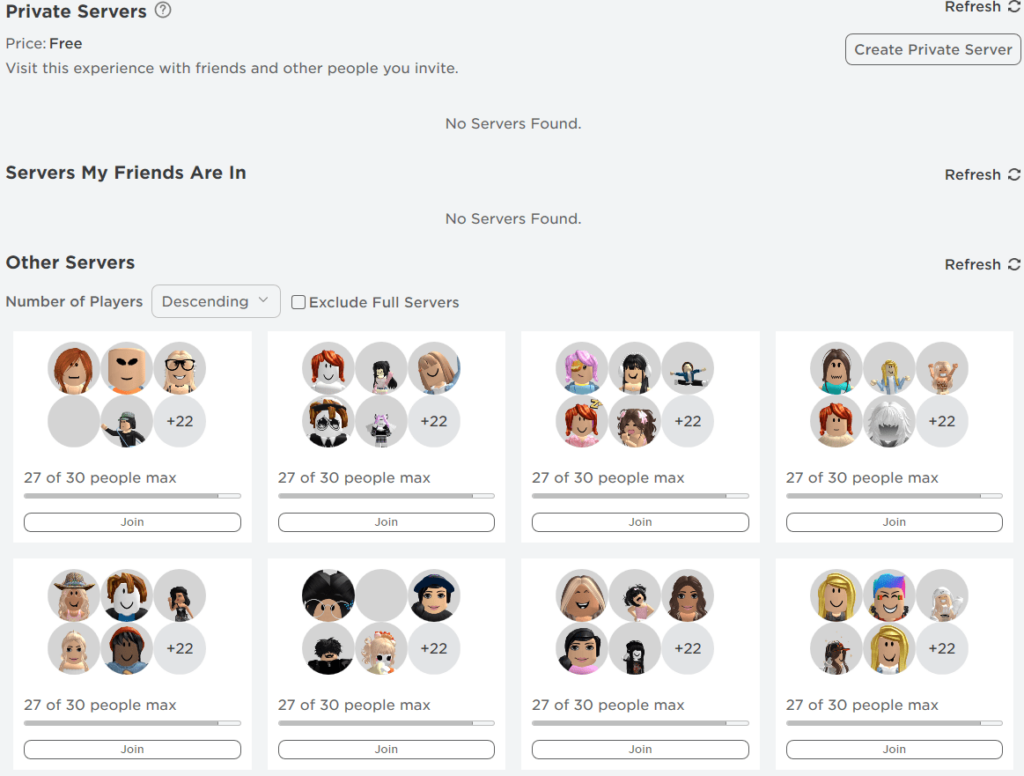
An example of unofficial game servers in a Roblox experience (“Conveyor Sushi Restaurant”)
Who Plays on Dedicated Game Servers, and Why?
It’s mostly Gen Z (born 1995-2009) and Gen Alpha (born 2010 or later) playing on dedicated servers. They may lack spending power, but they represent a huge audience and have the potential for long-term brand attachment.
These generations also engage with video games at higher rates than the rest of the population and increasingly prefer to do so over other forms of entertainment like music or television.

Source: Deloitte
When we take a closer look at the titles most popular among these age groups, we see an abundance of social, multiplayer, and UGC titles. Various sources rank the top titles differently (1, 2, 3), and they will fluctuate over time, but they usually include Minecraft, Grand Theft Auto V, Roblox, and Fortnite – all games with UGC and robust unofficial server offerings.
These games are massive, with DAUs in the millions; Roblox alone reported upwards of 65m DAU in Q2’23, with ~43% of players under the age of 13. Fortnite, meanwhile, boasts MAUs north of 235m. Activeplayer.io estimates monthly active player counts for Minecraft and GTA V at roughly 163m and 19m, respectively.
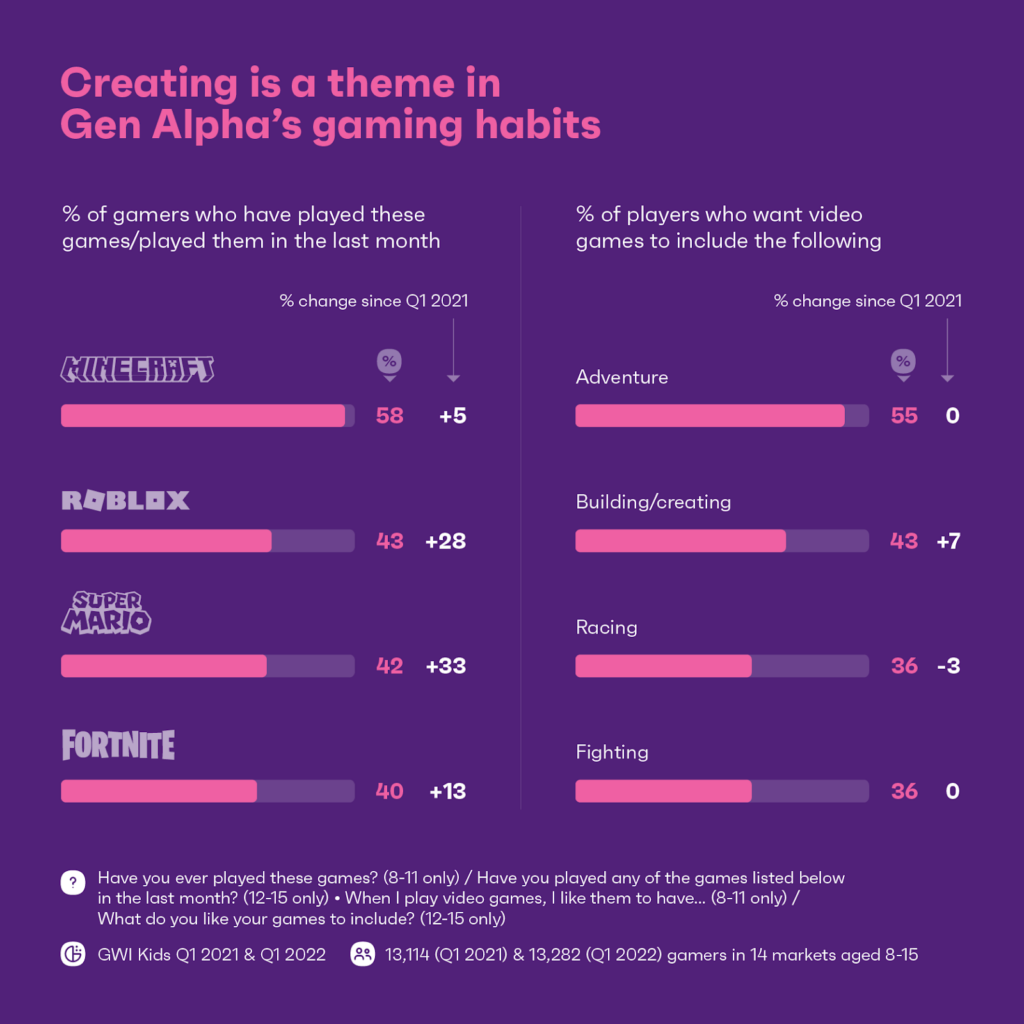
Increasingly, these players want to find their own niches. Whereas gamers of prior generations might simply switch to a new title to get that, Gen Z and Gen Alpha audiences may find switching more difficult.
For one, most of their friends are likely already on the same platforms. And because these platforms are often live services, players might feel a “sunk cost” effect when considering switching to another game. They likely have cosmetics, virtual currency balances, customized avatars, friends lists, and so on that would be left behind were they to ever leave.
Here is where unofficial servers play an important role: Players can remain within an ecosystem but also find experiences that suit their preferences. For example, playing with a smaller group of friends, engaging only with a specific type of experience, or increasing the privacy of their play session. Server operators get the tools and audience of the game ecosystem but also the opportunity to extend the game in interesting new ways. This extensibility often includes opportunities to layer in the monetization of additional and/or exclusive content. According to Newzoo (below), this is a perfect match for Gen Z and Gen Alpha gamers looking to spend money on games.

There are narratives and communities emerging from these unofficial servers that make them especially sticky for users. Roleplaying servers like DreamSMP (Minecraft) and NoPixel (Grand Theft Auto V) bridge the gap between the standard game world and the celebrities and influencers they see on Twitch and YouTube. These personalities use the game worlds for all manner of narrative fantasies, like a reimagined Internet-native soap opera. Check out a couple fun examples:
Dream SMP: The Complete Story - Part 1
JAMES RANDAL FUNNY MOMENTS #24 | NoPixel
These experiences are uniquely enabled by unofficial game servers: The server operators are able to create freely without needing to rely on game publishers to support them with bespoke content. Microsoft and Mojang would never have created something as intricate and robust as DreamSMP on their own, for instance.
Server operation also now represents a business opportunity that didn’t exist in previous years. Modders and developers can add monetization, web shops, analytics, and more to their servers with relative ease. It is only in recent years that support services like global payment and tax compliance, customer purchase support, and fraud and chargeback insurance have been made more broadly available, further lowering barriers to entry and making server operation a viable creator business.
Server operators are also able to manually limit participation. This prevents random players from mistakenly joining the action and stops so-called “stream snipers” from interfering with any unfolding roleplay or narratives. NoPixel, for example, utilizes an application system that requires hopeful participants to create detailed characters with backstories, motivations, and occupations within the game world that they are expected to roleplay as throughout their session time.
What are the Future Implications?
Could we see virtual worlds that support multiple high-growth businesses built by server operators? This now seems likely given the success of developers on Roblox and the early momentum building around UEFN, where more than half of Fortnite players engage with Creative mode and teams like Look North World, 100 Thieves, HaZimation, and others are flocking to the ecosystem.
The aspects of these platforms that make them attractive to professional development teams – audience size, robust toolsets, the ease of creation and deployment – are the same aspects that will attract smaller, independent server operators, too.
However, as more and more of these server operators start to see success, conflict with the platforms may inevitably emerge. Every game has its own patchwork of terms and conditions, privacy policies, and end user license agreements (EULAs). And in all likelihood, most creators are ignoring them entirely. Yet these are exactly the agreements that dictate what can and cannot be built on these UGC platforms.
We have already seen this kind of conflict occur in games like Minecraft, where Mojang pushed back on monetization tactics employed on their servers. Implementing new technologies on top of UGC platforms, such as incorporating NFTs or using AI-enabled mods, is also risky.
There are plenty of other reasons server operators may run afoul of a platform’s EULA. Improper use of IP, for example, or violations of platform rules on safety and security.
This highlights the importance of communication between platform holders and server operators. If handled poorly, policy changes can draw the ire of player communities – as Minecraft discovered when updating its platform moderation rules over private servers.
Platform holders can also lose out on new high-growth businesses and audiences. Just as Blizzard missed out on the value of the original DOTA mod from Warcraft 3 or Mojang lost the opportunity to get any value from Hypixel’s forthcoming Hytale, platform holders should be wary of incubating new businesses, game genres, and communities without plans to retain them. After all, Fortnite, Minecraft, and Roblox audiences are huge, and we’ll likely see an increase in both the quantity and quality of talented creators and creator-driven servers on these platforms as they evolve.
We are already seeing new business leaders emerge as a result of early exposure to UGC platforms. Founders like Alex Singer (CEO, Voldex) and Mishi McDuff (CEO, House of Blueberry), for example, started their careers as UGC entrepreneurs within Minecraft and Second Life respectively. Today, they operate fast-growing, venture-backed startups within the UGC ecosystem:
- Voldex reported 1m+ DAU across its UGC experiences after raising a Series A investment in January from heavy hitters like Andreessen Horowitz and Makers Fund. The company currently has more than 50 employees, according to LinkedIn.
- House of Blueberry has collaborated with brands and IPs like Teletubbies, Dear Evan Hansen, and Boy Meets Girl. The company raised a $6m seed round in January from Makers Fund for its “digital fashion house.”
These two companies are far from the only ones. Other notable examples include Shockbyte’s Mitch Smith, Anne Shoemaker of Fullflower Studio (a game development studio specializing in Roblox experiences), and Colin McDonald of Moonsworth (a Minecraft server developer). While not all of these entrepreneurs operate dedicated game servers themselves, they are emblematic of the talented, creative individuals these environments enable.
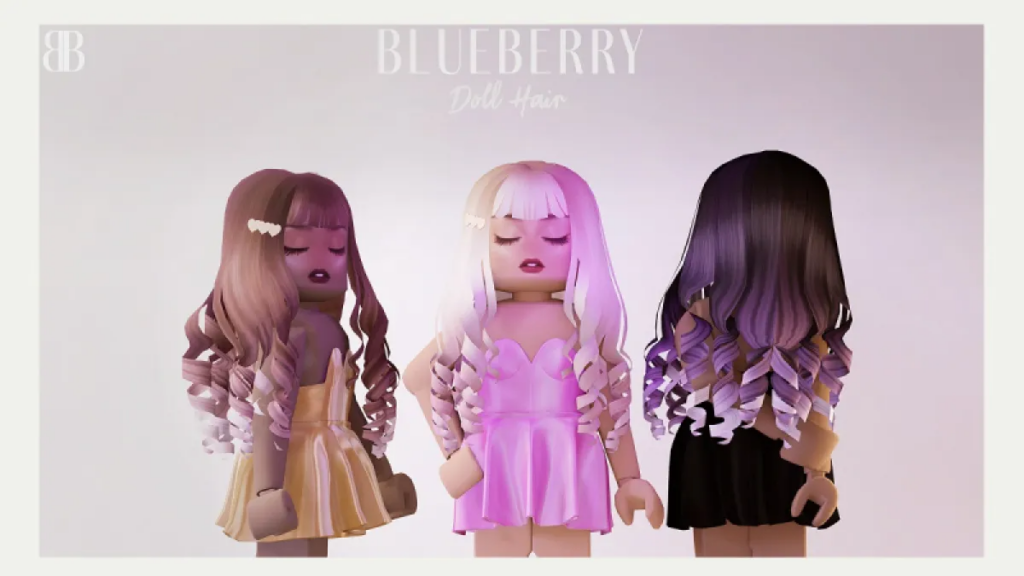
Image Credit: VentureBeat
Incumbent publishers have a few options here. They can identify high potential server operators and bring them into the fold by acqui-hire, as Riot Games did with the Hypixel team. Another path is to acquire the ecosystem tools, as Rockstar Games did with Cfx.re, creators of the FiveM and RedM modding tools that underpin NoPixel and other popular roleplay servers. A third option is to support emerging creators with tools, integrations, and policy updates that ensure the continued viability of server operation as an entrepreneurial endeavor.
Inevitably though, some server operators will go independent in an attempt to capture greater value or launch a new games business. Creators using a single platform expose themselves to platform risk – if the platform changes its discovery algorithm, a piece of infrastructure, a tool, plugin, or in some way alters the competitive landscape, server operators must scramble to accommodate those changes.
While platforms do their best to retain creators by offering better tools, discovery, and revenue splits, there will always be entrepreneurs keen to forge their own paths away from these platforms. Perhaps they (or their audiences) have “aged out”; maybe they want to try more advanced creation tools. Whatever the case, these creators will enter a market that is increasingly friendly to server operators.
Creator-friendly services like Overwolf’s Tebex are increasingly supported by the dominant UGC games and modding platforms. By integrating with broad swathes of games and handling the challenging aspects of monetization that creators have little expertise in (financial compliance, worldwide payments, transfer of funds, and so on), private server operation is less risky, more attainable, and more lucrative than ever.

Source: A sampling of game servers supported by Tebex
Game developers are also being drawn to UGC platforms. Roblox’s massive audience is a draw for businesses seeking to de-risk their development costs, and the desire among players to create and operate their own servers is not going away any time soon. As such, we should expect to see more developers integrate unofficial server hosting into their titles in an attempt to lure this valuable audience to their games.
Organizations with deep pockets will aspire to take on incumbents like Fortnite and Roblox with UGC plays of their own, and it will be interesting to see how this market shift manifests at the mid- and low-budget tiers of the industry. It seems likely that more developers will seek to open up unofficial servers for their audiences.
Encouraging unofficial game servers acts like outsourced community development and product R&D for smaller teams – particularly as services like Tebex make this more cost-effective for developers to implement into their titles. Rather than spending limited internal resources on new content and risky bets, why wouldn’t a smaller game developer encourage players to experiment on the game team’s behalf?
The emergence and increasing prevalence of server operators in the games industry is a trend worth watching. Expect to see a number of related developments occur as a result:
Multiple large publishers will try – and likely fail – to challenge the dominance of Roblox and Fortnite as game creator platforms. The likeliest challenger in this space will probably be Rockstar Games, given its recent acquisition of Cfx.re and the pending launch of the new Grand Theft Auto title. One has to assume that this game will be a hotbed of modding and new server creation.
A growing “middle class” of creators and server operators. These users will sit somewhere between casual hobbyists and the professional teams that run servers like Hypixel. They will likely also serve a “middle class” of games – as more games enable unofficial server usage and more community-driven experiences, enterprising server operators will carve out their own niches.
The creation of new, innovative experiences within niche server communities. Just as battle royales, auto-battlers, and MOBAs all emerged from dedicated groups of modders and creators, it is likely that the ongoing growth of dedicated game servers alongside the continued dominance of UGC platforms will lead to wholly new games and genres.
Game servers are about bringing groups of like-minded people together. Soon, gaming with friends on a dedicated game server will be as streamlined and commonplace as grouping up on a Discord chat server. That's a future we're excited about.
(P.S. - Thank you team Overwolf for sharing your insights and feedback with us on this piece! Also make sure to check out our recent interview with Overwolf's founder and CEO, Uri Marchand.)
A big thanks to our Open Gaming Research Initiative partners for helping support Naavik’s free research. Learn more about them here.

Naavik has helped 250+ games teams with game & economy design, market research, user acquisition, and more. If interested in how Naavik can help your team, make sure to learn more and get in touch.



